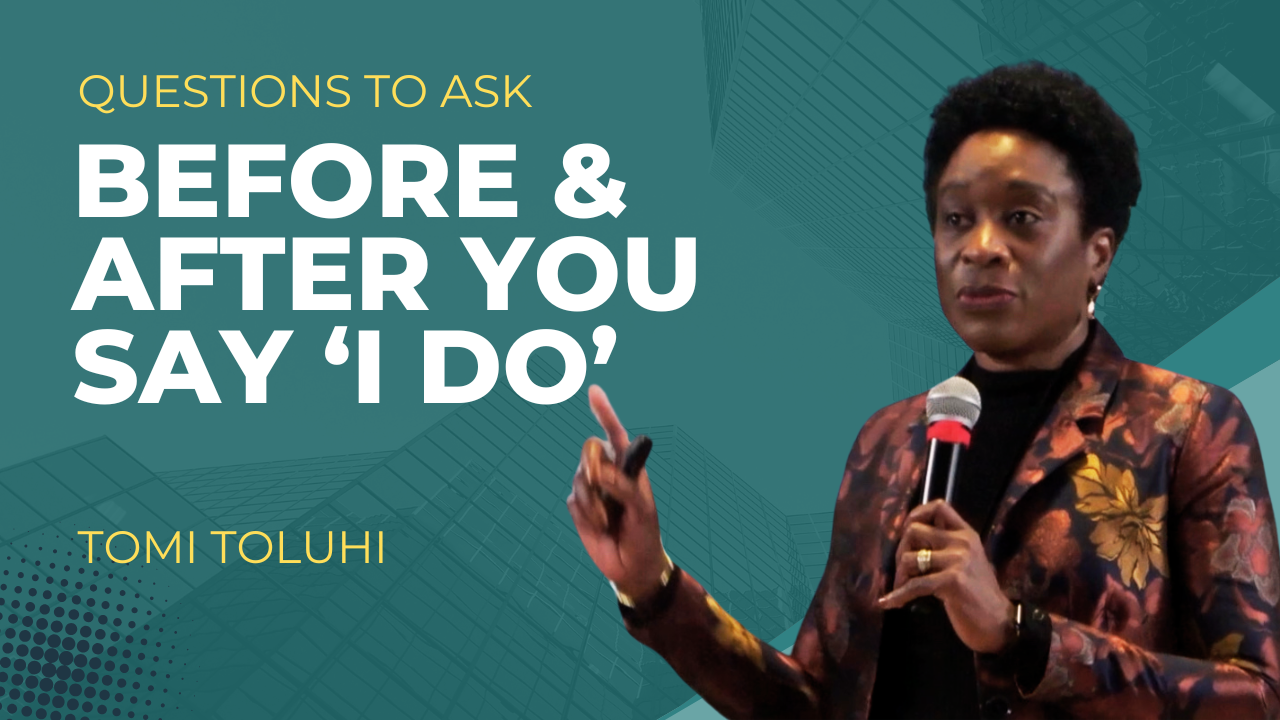How to change your spouse
‘How can I change my spouse?’ This is a question that frequently comes up during Q&A sessions in my seminars. I also receive a lot of mail from people who want to change one thing or the other in their spouse. You may be reading this because your spouse has habits that are driving you round the bend. Read on!
Give up trying to change your spouse yourself
Ironically, the first key to changing your spouse is to stop trying to do it yourself. This sounds counter intuitive but the reality is that no human being has the capacity to change another human being. We change because we want to and it is God that puts the ‘want to’ inside of us. Philippians 2:13 explains it this way. ‘God is working in you to help you want to do and be able to do what pleases him.’ Ask God to work in your spouse. Often we try to work on our spouse rather than letting God work in our spouse.
You must decide whether what you want is change or adjustment. Adjustment is a response to external pressure. Change is a response to internal conviction. Adjustment is temporary; change is permanent. This is vividly illustrated by people who try to pressure a person to change their behaviour as a condition of marriage. They lay down ultimatums like ‘If you change XYZ I will marry you’. The difficulty with adjusting under external pressure is that as soon as the external pressure is removed we revert back to our natural self. Once the marriage is achieved the person has no further incentive to keep up the behaviour adjustment. If what you want is a real heart change in your spouse then you have to hand them over to God and trust God to engineer the change from the inside out. The less you try the more effective it is. Pressure does not change people permanently, conviction does. Only God has the capacity to truly change another human being.
Consider whether you’re the one who needs to change
Sometimes we get so fixated on something our spouse is doing that we fail to recognise that our attitude is the problem, rather than our spouse’s behaviour. Matthew 7:1-4 [MSG] puts it this way. ‘Don’t pick on people, jump on their failures, criticize their faults— unless, of course, you want the same treatment. That critical spirit has a way of boomeranging. It’s easy to see a smudge on your neighbour’s face and be oblivious to the ugly sneer on your own. Do you have the nerve to say, “Let me wash your face for you,” when your own face is distorted by contempt?’ Ouch! Painful to admit but true. We all have a tendency to judge others harshly and judge ourselves leniently.
Give grace to your spouse because you are not perfect yourself. As you bear with your spouse’s weaknesses remember that he or she will have to bear with yours as well. Because you are a recipient of grace you should be prepared to be a giver of grace. The areas in which you need grace may be different from your spouse’s but you do need grace nonetheless. Sometimes we focus so hard on our spouse’s faults that that becomes the only reality we see. Adjusting your focus helps you gain a more balanced perspective of your spouse and reminds you of all the positives you may be ignoring.
Complement rather than criticise
Consider the possibility that your spouse is trying hard to change but may not find it easy in certain areas. We each have peculiar strengths and weaknesses. In areas where we are strong we tend to take for granted how difficult those things can be for someone who is not naturally strong in those areas. For instance, someone who is naturally organised may never be able to fully appreciate how hard it is for a scattered person to get – and crucially stay – organised. People who are verbally astute can often be intolerant of people who find it hard to express themselves, while people who are good with money feel like people with poor money skills belong on another planet!
We take for granted our own giftings and assume that others should be able to function as we do, forgetting that very often it was that gifting which attracted your spouse to you in the first place. Subconsciously, your spouse recognised their need for your strengths, which is why opposites tend to attract. It may well be that the change you are trying to effect in your spouse is the very weakness God brought you into his or her life to compensate for. That’s what covenant is about. You pledge to help each other out with your complementary strengths such that you are stronger together than you would each have been apart. You become more relevant in your spouse’s life when you step in with your own strengths to make his or her life better.
Give the gift of acceptance
You earn the right to speak into your spouse’s life by being supportive. A coach earns the right to correct an athlete by first demonstrating belief in that athlete. When people believe in us we are less defensive when they make suggestions to us. Relationship gives you the right to speak into another person’s life. Relationship in marriage is not a foregone conclusion. Some couples are no more than glorified roommates. The more interconnected your lives become, the more of a stake you have in each other’s outcomes. If you want to be more influential in your spouse’s life, position yourself as his or her best friend and look out for their best interests at all times
Shower your spouse with faith in his or her abilities. Let your spouse know that you believe in him or her wholeheartedly, without reservation. Your acceptance of your spouse should not be conditional upon a prescribed level of achievement or standard of behaviour. When your spouse is confident that you believe in them as a person, you will be able to comment on certain behaviour traits or actions objectively without them feeling rejected. Proverbs 27:6 puts it this way. ‘Faithful are the wounds of a friend [who corrects out of love and concern], But the kisses of an enemy are deceitful [because they serve his hidden agenda].’ We are more likely to accept feedback from a trusted friend than an uninvolved stranger.
Give up trying to control your spouse
God made us free moral agents not robots. God could control us if He wanted to but rather He gives us the opportunity to make choices. If you keep attempting to take away your spouse’s right to make independent choices, your spouse will keep resisting your attempts to control them and make them change. This is the dynamic of nagging, which is an attempt to control the behaviour of your spouse by berating the behaviour you perceive as negative. At some point you will have to come to terms with the reality that the person you married will sometimes have preferences that are different from yours. Your spouse has a right to their own preferences as long as those preferences are not harmful.
You have to be able to differentiate between desires and deal-breakers. Desires are simply areas where your spouse has preferences that may be different from yours. Deal breakers are preferences that are harmful and therefore should not be tolerated in the context of a Christian marriage, for example addictions, pornography, infidelity, abuse and violence. Distinguishing one from the other will put you on the road to satisfaction in marriage. Satisfaction in marriage does not come from having your own way; it comes from you and your spouse being free to grow into the best version of you possible in a mutually supportive environment. Sometimes this involves the freedom to make mistakes but when we learn from those mistakes they don’t define us, they empower us to make better choices next time. Give your spouse the freedom to grow.
Be a good example
You cannot change bad behaviour by demonstrating bad behaviour yourself. Your obedience to God’s word must be complete if you are seeking God to change your spouse. When you respond to your spouse’s bad behaviour with bad behaviour, you give them the opportunity to justify their own bad behaviour as a response to yours. You can only ever defeat negativity with heavy doses of positivity. Fire doesn’t quench fire; water quenches fire. 1 Peter 3:1-2, speaking specifically to wives, explains that even if a husband is disobedient to God’s word he can be won over, not by nagging but by his wife’s godly conduct. I am persuaded that this principle is a major key to influencing your spouse. Godly conduct convicts. One godly act is way more effective than all the speeches in the world.
Have you allowed yourself to be sucked into a cycle of negativity by a negative spouse? If you want to stop that cycle, you need to extract yourself from it. Refuse to allow yourself to mirror bad behaviour. Take the high road even when you are subject to poor treatment like temper tantrums, neglect, disrespect or hurtful speech. Romans 12:17-18 is just as relevant today as when it was first written. ‘Never pay back evil with more evil. Do things in such a way that everyone can see you are honourable. Do all that you can to live in peace with everyone.’
Set appropriate boundaries to protect yourself
We are called to be tolerant and forgiving in all our relationships but there needs to be a distinction between times when someone causes us hurt and when they do us damage. Every human relationship can hurtful at various times, simply because we are human. We say or do things that hurt each other but usually it is not with the intention to harm. When a person intentionally puts you in harm’s way or does things deliberately to cause you damage, it is your responsibility to protect yourself.
In His tense relationship with the Jews and Pharisees, Jesus knew when to speak up and when to stand down. He knew when to show up and when to disappear. Time and again, scriptures state that Jesus slipped away or hid Himself when things got too intense and He was in danger of being stoned or thrown off a cliff. Removing yourself from a potentially damaging situation is not a sign of weakness; it is a sign of wisdom. Proverbs 22:3 and 27:12 say exactly the same thing, perhaps for emphasis. ‘A prudent person foresees danger and takes precautions. The simpleton goes blindly on and suffers the consequences.’ No one is called to be a martyr to save a marriage; you have to stay alive to save your marriage. If you are in danger of physical or psychological harm because of your spouse’s behaviour, it is wise to remove yourself from that environment while seeking external intervention to tackle the situation. Talk to an experienced counsellor who can help you develop an action plan if you find yourself in such a situation.










